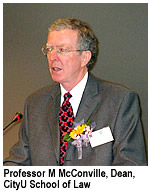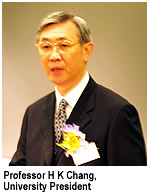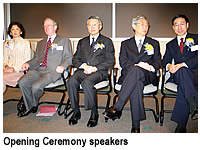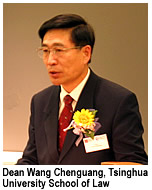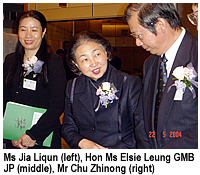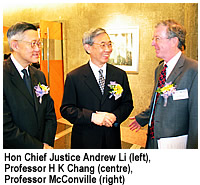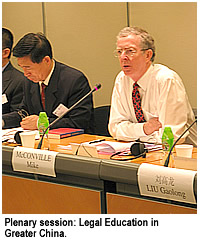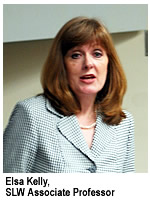"We need to teach students not what to think, but how to think," Dean of CityU's
School of Law (SLW)
Professor Mike McConville emphasized at the 'Conference on Legal Education in Greater China—Meeting the Challenges of the Twenty-First Century' held 21 and 22 May. "Legal education, as well as the making of a law school, is never finished," he said. "It is a project rather than an achievement. And it is a project best achieved through personal
interaction and dialogue in the formal and informal exchanges during the course of the Conference, and for which the introductory papers are merely the setting."
City University of Hong Kong President
Professor H K Chang gave a welcome speech at the Opening Ceremony, affirming the purport of the SLW, not only for CityU, but also for Greater China. "The
School of Law is an integral part in the organization of CityU," he said. "The University will continue to support the
development of the School in research, teaching, outreach, exchange and cooperation with external organizations, aiming to groom legal professionals for
Hong Kong society and for the region."
Law education—past, present and future
Comprehensive in scope, the Conference gave law professionals, in addition to deans and professors from some 20 law schools in Australia, the US, mainland China, Hong Kong, Macau, and Taiwan opportunities to discuss the recent developments and future requirements of law education, from history and reform through skills training, assessment, transnational lawyering, and regional cooperation.
Dean of the Tsinghua University School of Law Professor Wang Chenguang, in his opening remarks, asserted, "Legal education is not just about the teaching of law subjects or knowledge. In designing the curriculum for legal education, we should consider the career planning and development of the students, and also put emphasis on nurturing their personalities and provide them with humanities/liberal arts education."
Other Guest Speakers at the Conference were:
Ms Cecilia Chen JP of the Hong Kong Legal Education Trust Fund;
Hon Chief Justice Andrew Li;
Hon Ms Elsie Leung, GBM, JP;
Ms Jia Liqun, Deputy Director, Bureau of Exams, Ministry of Justice; and
Mr Chu Zhinong, Director, Department of Education, Science and Technology, Liaison Office of the Central People's Government in the Hong Kong SAR.
Mutually beneficial discussions
"This Conference means a lot to me," Professor Chang commented, "because, firstly, our School of Law really has made enormous progress in the last decade or so, as has the quality of students we produce. This Conference is a testimony to the high esteem in which the School is held by others. Secondly, we are
doing something very timely for the Greater China region. Very rarely can legal scholars from the mainland,
Taiwan,
Hong Kong and
Macau get together. As Chief Justice Li said, each area has its own legal system and jurisdiction, but there is a common cultural base and understanding. Hopefully, through such discussions, we can mutually benefit each other's legal education and legal system."
"Today, we will learn very quickly, I think, that pockets of excellence in China have thought about Law and legal education," Professor McConville observed, "and that they are being innovative and imaginative in their teaching. Of course, while we are confident that we have a great deal to teach them and the rest of the world, we will also learn a great deal from them. The important thing about a
conference is not the speeches, but the dialogue. That is going to be the highlight of the next two days."
Enduring and friendly cooperation
The Conference was held in conjunction with The Legal Education Trust Fund and sponsored by the Alumni Association of the School of Law of the City University of Hong Kong. Co-hosted by Tsinghua University's School of Law and CityU's School of Law, the Conference was the culmination of an enduring cooperative relationship between the two institutions. "Our two institutions are intellectually very close," Professor McConville noted, "and close institutional friendships are best founded in personal friendships. Dean Wang Chenguang, one of our alumni, and Vice Dean Wang Zhenmin are good friends of mine, so we couldn't have asked for a better start to a cooperative relationship."
Professor Chang concurred, "We have maintained a very cordial and productive relationship with a number of mainland institutions. With Tsinghua University, it comes naturally, as their Dean was once our Vice Dean, so we enjoy a privileged position with them. Tsinghua University is also a very prestigious institution—one of the most prestigious on the mainland—so their willingness to co-host the Conference with us is, again, testimony to the positive shift we have made."
Experiential and contextual learning encouraged
A strong sense of commitment to student-centred teaching and learning prevailed in the plenary sessions and panel discussions. Wen Shiyang Vice Dean of the Wuhan University Law School argued that "Vocational skills training is an essential element of legal education." This view was upheld and complemented in presentations by, for instance, Xiao Jinming, Shandong University Law School's Deputy Dean, who proposed that Professional Master of Laws degree (JM) education "must attach importance to both practical training and academic teaching." "Wherever law is
studied today, I believe that the broad contextual approach is now inescapable," Professor McConville reflected.
Terry Gygar Associate Professor at Bond University's School of Law stated, "Integrated skills courses require greater resources and
commitment by staff, but experience indicates that they are the most effective and practical way of achieving high levels of student competence in practical legal skills."
Elsa Kelly, SLW Associate Professor also touched upon the need for additional
resources in order to provide "learning by doing" opportunities, in her presentation on 'Intensive Vocational Training'. Meanwhile,
Eric Chui, SLW Assistant Professor recommended that Web-assisted instruction "should be regarded as a supplement to didactic lectures and tutorials."
For the Conference programme, click here. [
English
/
Chinese
]
Emerging from the Conference, some essential ingredients in a comprehensive strategy for meeting the challenges legal education faces in the twenty-first century were itemized: innovative and interactive teaching methods; clearly defined desired learning outcomes; and assessment alignment with those outcomes—all relevant to legal education not only in Greater China or in Asia, but in the world. Professor McConville summed up, "The transformation of legal education begins with the teachers, that is, ourselves, who need to be given the training opportunities required to take on board this new legal educational order."
The ambitious and intensive two-day Conference ended on a high note with a well-attended banquet at The Royal Pacific Hotel in Tsim Sha Tsui.
